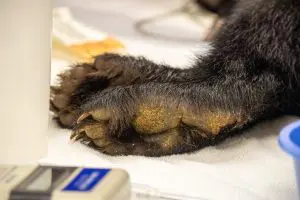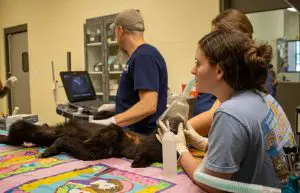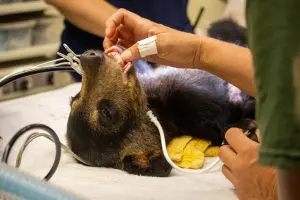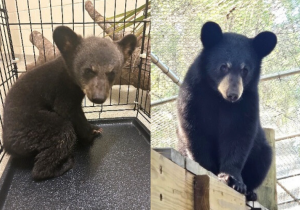

Since the opening of our Black Bear Rehabilitation Center, we’ve now cared for seven cubs!
Editor’s Note: The Florida Fish and Wildlife Conservation Commission’s (FWC) Bear Management Program works closely with Brevard Zoo and other partners to ensure orphaned black bear cubs not yet able to survive on their own are given the best chances at successful rehabilitation and eventual release back into their natural habitat. FWC Bear Management biologists are scheduling releases of rehabilitated bear cubs born this year to be done in January 2026, which is outside of Florida’s black bear hunting season set for December 2025. Additionally, rehabilitated bear cubs will be released into habitat that is not part of current established bear hunting zones. The FWC aims to release rehabilitated young bears on public conservation areas that have high quality bear habitat and low density of both bears and people to give them the best chances for survival.
Our cub crew just keeps on growing! Over the summer, our Zoo took in two Florida black bear cubs who needed our help: Jordan and Berry.
Jordan, an 18-month-old bear, came to us in poor condition; She was covered in ticks with a wound to her foot, and she was underweight for what’s expected of her age.

During intake exams, Director of Veterinary Programs Dr. Trevor Zachariah and our team perform a full checkup, including bloodwork, an ultrasound, tick removal and more.
“Yearlings”, or bears that are aged a year or older, have a different temperament than the months-old cubs we typically see in our care. They are far more independent and unfortunately, they don’t always play nicely with others or thrive overall in a rehabilitation space.
This meant that Jordan resided separately from our other bear cub patients in a behind-the-scenes space at our L3Harris Animal Care Center. But don’t worry, she wasn’t there for long! After a month of TLC, proper nutrition and wound care, Jordan was all better in no time.
Because of the nature of her age, it was in Jordan’s best interest to release her sooner than the other cubs, who are scheduled to be released in January of next year. We’re happy to share that our partners at the Florida Fish and Wildlife Conservation Commission (FWC) Bear Management team released Jordan recently, and she is now back in a part of her natural habitat that is not in current established bear hunting zones.
Berry is another Florida black bear cub who FWC found wandering alone in early August.

Berry can be identified by his frosty, mask-like markings on his face.
At six months old, Berry’s condition wasn’t too bad! As expected, he was ridden with ticks, which we promptly removed during his intake exam. He also had a bot fly nestled in his fur, a species of fly whose larvae grow inside its host’s body. Luckily, our team caught the bot fly before its larvae caused any major complications, and we quickly administered antibiotics to the cub.
After some time, Berry’s bot fly wound healed, and he was up 18 pounds in just a few weeks! Berry was now ready to join the five cubs currently in our Black Bear Rehabilitation Center: Rickie, Morty, Frosty, Fern and Branch.
As we take in more and more cubs, it’s getting harder to tell them apart! Bears with blonde coloring like Frosty and Berry stand out more than the others, but our team makes sure to pay attention to key features like the position of their eyebrows and eye shape.

We believe this is Frosty the cub! Can you believe how much she’s grown already?
For now, we’ll continue to care for our ever-growing number of cub patients. Stay tuned for more updates…or should we say cub-dates?
We would like to thank the following generous donors for supporting our mission-based programs:
Flammio Financial Group · Stifel- Garvin Wealth Management Group · Artemis IT · Pepsi Bottling Company · Amazon · PCL Construction | Nassal | MEC | Heard
Contact FWC’s Wildlife Alert Hotline at 888-404-FWCC (3922) if you have found a sick, orphaned, injured or dead Florida black bear. To leave feedback on FWC’s Bear Management Plan, reach out to the Bear Management team at BearManagementatMyFWC.com. The FWC commissioners can be contacted here.